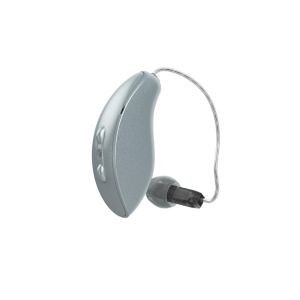Starkey Omega AI
- World's First DNN 360 Technology
- Industry-Leading 51-Hour Battery
- Comprehensive Health Tracking
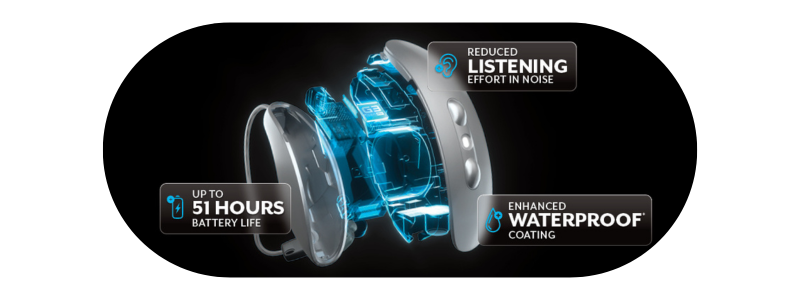
Starkey Omega AI Hearing Aid Range
Reviews, Styles, Features & Benefits
Overview
Starkey's Omega AI hearing aid range represents what the company calls "technology so intelligent, it's superhuman." It's quite possibly the boldest claim in hearing aid marketing this year, but having looked at what's inside these devices, it's not entirely hyperbole.
The Omega AI range introduces DNN 360, the world's first deep neural network-powered directionality system, alongside impressive battery life and genuine health-tracking features that go well beyond what most hearing aids offer.
This is Starkey's fifth generation of AI-powered hearing aids, and rather than just refining the previous Edge AI model, they've fundamentally reimagined how hearing aids process sound.
The new G3 Neuro Processor operates six times faster than the previous generation, analysing up to 80 million sound data points per hour. The processor doesn't just react to your environment - it actually anticipates what you need to hear next, which makes a real difference to how natural conversations feel.
If you lead an active life - whether that's regular exercise or outdoor activities - the Omega AI's waterproof design and great durability mean your hearing aids can actually keep up with you.
And with battery life that extends beyond 51 hours on some models, you won't be constantly worrying about charging. It's rather like having hearing aids that understand real life doesn't happen in controlled environments.
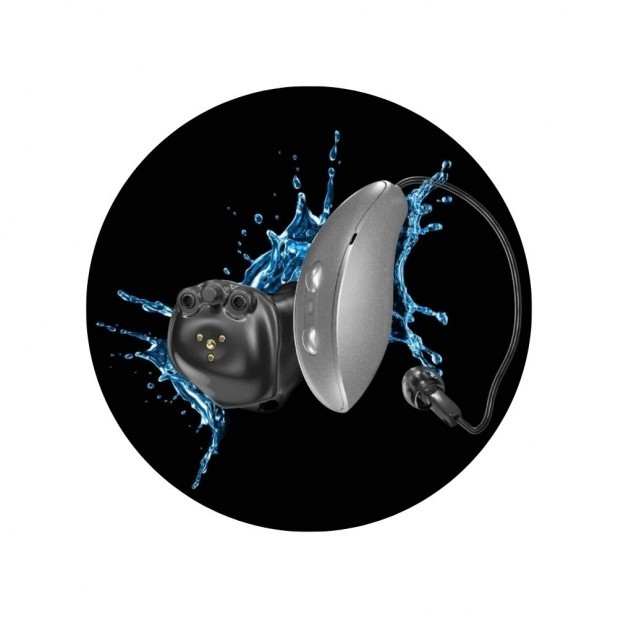
Quick shared feature highlights
DNN 360
Both the standard RIC and mini RIC models in the Omega AI range are built on DNN 360, which is genuinely revolutionary technology.
Unlike traditional directional microphones that simply focus on what's in front of you, DNN 360 continuously analyses your entire sound environment using trained neural networks.
It distinguishes speech from noise, locates conversation partners across all 360 degrees, and responds instantaneously rather than waiting for noise changes to occur.
Starkey claims improvements in speech intelligibility ranging from 20% to 28% in challenging environments, depending on the performance level, with up to an 8 dB improvement in signal-to-noise ratio.
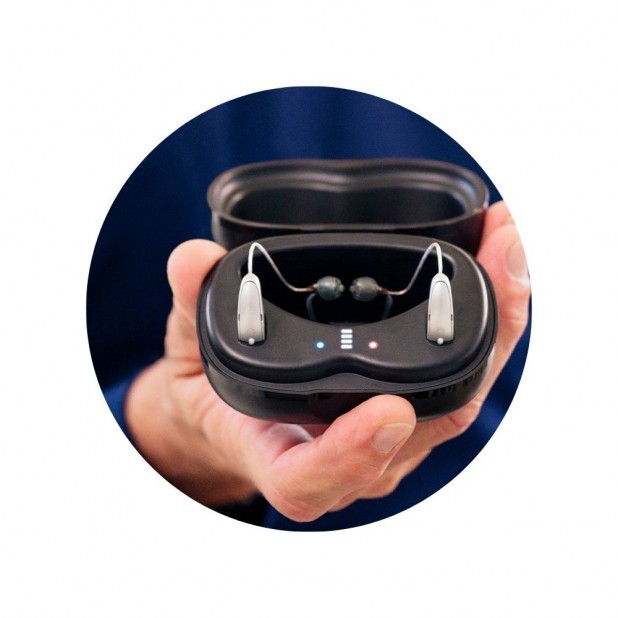
That's not just incremental improvement
It's the sort of leap that makes a genuine difference to daily life. In practical terms, this means far fewer "pardon?" moments when you're out at the shops or having coffee with friends.
The system works by combining DNN Directionality (which focuses on speech during conversations), DNN Spatial Awareness (which keeps your surroundings natural when you're not actively engaged in speech), and Motion-Based Optimisation (which uses sensors to adjust behaviour when you're moving).
The underlying AI is trained on millions of real-life audio samples, enabling the hearing aids to identify speech patterns more quickly and accurately than previous generations.

Edge Mode+
Here's a feature that addresses a real problem - those moments when automatic processing isn't quite enough. Perhaps you're in an exceptionally noisy restaurant or a crowded event with competing voices from all directions.
Edge Mode (available on AI 20 and AI 16) and Edge Mode+ (on the AI 24) give you a manual overridegives you a manual override that re-analyses the environment in real-time and temporarily applies stronger settings for noise reduction, directionality, and compression.
Think of it as your secret weapon for those situations where you'd normally just give up and nod along, pretending you've heard what someone said.
It's activated through the My Starkey app or with a button press on the top-tier models, and whilst it was originally introduced in the previous Edge AI range, it worked well enough that Starkey kept and enhanced it.
Edge Mode+ on the AI 24 now offers real-time adaptive enhancement, automatically adjusting as you move between environments. This is the sort of practical feature that shows they actually listen to what users need.
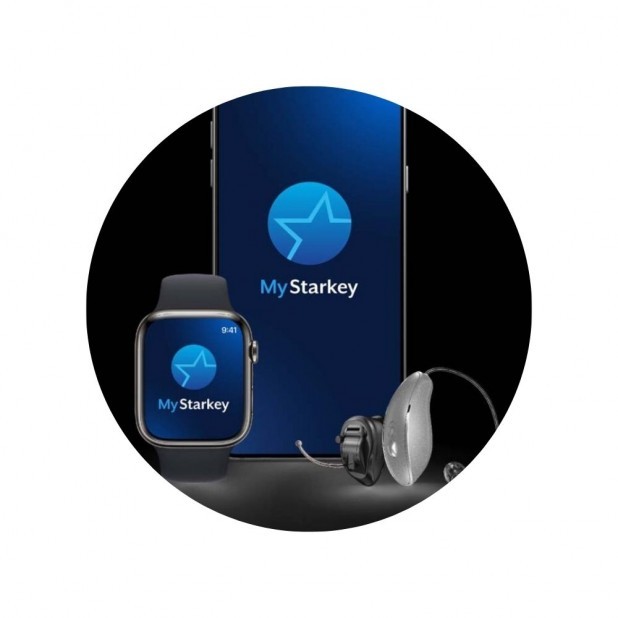
Health and wellness tracking
Starkey continues to lead in what they call "Healthable" hearing technology. Through the My Starkey app, Omega AI offers fall detection, tracks your steps and social activity, and includes Balance Builder.
A guided at-home exercise developed in partnership with Stanford University, designed to improve stability and coordination.
More impressively, the AI 24 and AI 20 models are the first hearing aids to offer automatic respiratory rate monitoring, tracking your breathing in the background.
The AI 16 offers motion and balance tracking plus step counting. This holistic approach to health monitoring sets Omega AI apart from competitors who focus solely on hearing.
It's rather like having wellness monitoring built into your hearing aids as a useful bonus, though the primary job remains helping you hear properly - as it should be.

Starkey Omega AI Hearing Aids
Battery, durability, and connectivity
Exceptional battery life
Battery life is frankly remarkable. However, the battery performance varies by model and performance level:
- AI 24: Up to 51 hours (RIC RT) / 31 hours (mini RIC R)
- AI 20: Up to 48 hours (RIC RT) / 28 hours (mini RIC R)
- AI 16: Up to 45 hours (RIC RT) / 26 hours (mini RIC R)
Even at the entry level, this means a full day's use with streaming, and you won't be constantly worrying about your aids running flat halfway through an important conversation. This means reliable all-day wear even with heavy streaming, and you won't be constantly worrying about your aids running flat halfway through an important conversation.
What makes this particularly noteworthy is that these battery figures are achieved whilst running the advanced DNN 360 processing continuously in the background. The G3 chip is 30% more efficient than previous technology, which enables this combination of power and longevity.
All models support fast-charge functionality for quick top-ups when you're in a hurry, and use Starkey's latest lithium-ion power cells designed for over 1,000 full charge cycles - giving years of reliable daily use without significant degradation.
And with our free home visits available throughout the UK, your audiologist can help optimise these settings in the environment where you'll actually be wearing them - your home, not a clinic.
Reliability and durability
The Omega AI aids are rated IP68 for water and dust resistance, but Starkey has gone further with a new waterproof coating that's tested to last 10 times longer than previous coatings under the toughest conditions. They've also introduced a new resin for custom-made models that's tougher and less fragile.
These aren't hearing aids that need to be babied - they're designed for real-world use. Light rain, sweaty gym sessions, or typical British drizzle aren't going to cause you any concern.
Here's something rather important that often gets overlooked - life happens in all weathers. The Omega AI carries an IP68 rating and features a waterproof coating tested to last 10 times longer than previous models.
This isn't just marketing speak about splashes; these aids are genuinely designed to handle weather, exercise, and the occasional mishap. If you've ever worried about getting caught in the rain or working up a sweat at the gym, these hearing aids are built to cope with exactly that.
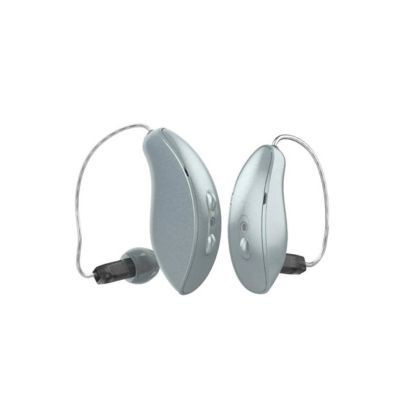
Smart LED indicators
This might sound like a small feature, but it's surprisingly practical. The new green and red LED indicator lights on RIC RT and mini RIC R models confirm power status and Bluetooth connection at a glance.
More cleverly, these LEDs double as a find-my-hearing-aid tool - an industry-first feature that helps you quickly locate misplaced devices in the dark. If you've ever spent 20 minutes hunting for a hearing aid before bed, you'll appreciate this. Because let's face it, we've all mislaid our hearing aids at some point, and trying to find them without being able to hear the "beep" is rather frustrating.
Bluetooth connectivity that actually works
The Omega AI supports Bluetooth LE Audio and is Auracast-ready (pending a firmware update), which means future-proof connectivity for next-generation public broadcast listening.
You can stream calls, music, and TV directly to both ears with stable connections that you'll actually want to use regularly. The AI 24 and AI 20 models support hands-free calling on compatible Apple iOS and Android devices, allowing you to take calls directly through the hearing aids without touching your phone.
Automatic TV streaming starts and reconnects seamlessly, which is how Bluetooth should work, but often doesn't in hearing aids. The connection is stable enough that you'll genuinely use these features rather than finding them too fiddly to bother with.
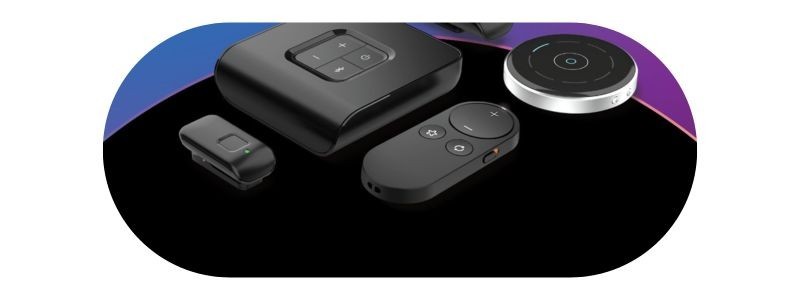
Starkey Omega AI Hearing Aids
AI technology, accessories and models available
Generative AI support
The My Starkey app includes TeleHear AI, which uses generative AI technology to listen to your sound concerns and solve them with 93% accuracy. There's also a Gen AI Smart Assistant that allows voice-controlled adjustments and answers to questions.
It's rather like having an audiologist available 24/7, and whilst it won't replace professional care, it's genuinely helpful for quick troubleshooting. This is particularly useful if you notice something needs adjusting on a Saturday evening - you can sort it out there and then rather than waiting until Monday to ring your audiologist.
StarLink wireless accessories
The Omega AI works seamlessly with Starkey's StarLink wireless accessories, including the Remote Microphone, Table Microphone, and TV Streamer. These are all rechargeable and Bluetooth-enabled, making them easy to pair and use. For people who regularly find themselves in challenging listening environments, these accessories can extend the hearing aids' capabilities significantly.
The portable StarLink Charger+ case provides on-the-go recharging and built-in drying to protect against moisture when travelling.
Both models are available through our qualified hearing care professionals who can assess your specific hearing needs and ensure proper fitting and programming. All testing, fitting, and lifelong aftercare are included in the price, with free home visits available throughout the UK.
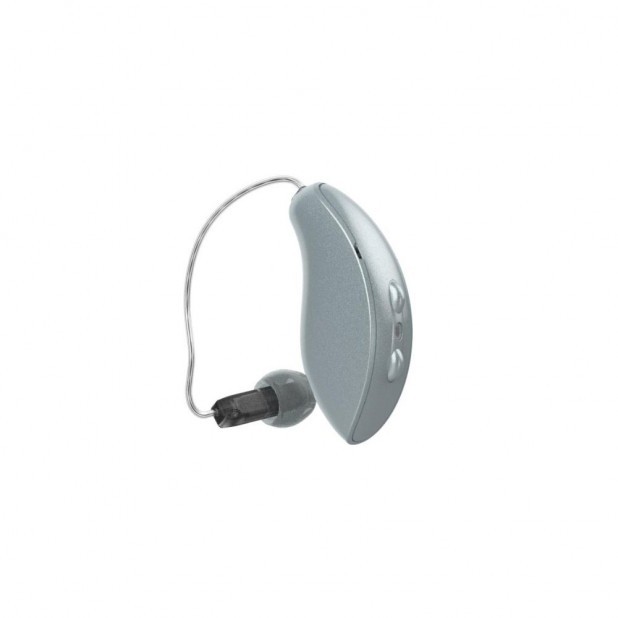
Starkey Omega AI RIC RT
Reliability with exceptional battery life
The RIC RT is the popular Receiver-in-Canal model, and it's built for people who need hearing aids that genuinely won't let them down.
This is the model that prioritises exceptional battery life and includes telecoil functionality for both modern and legacy assistive listening systems.
Available in performance levels: 24, 20, and 16
Available in colours: Silver, white, beige, caramel, graphite grey, chestnut, and tech black
Features at a glance: Waterproof, wireless, rechargeable, LED status indicator light, and telecoil.
Compatible accessories: StarLink Remote Microphone, Table Microphone, TV Streamer, and the My Starkey app.

51 hours of reliable power
The headline feature - battery life lasting more than two full days, even with regular streaming on the AI 24 model.
Ideal for busy lifestyles, frequent travellers, or anyone who occasionally forgets to charge overnight.
Telecoil for legacy systems and LED indicators for visibility
Whilst Auracast represents the future, many UK venues still use hearing loop systems. The built-in telecoil covers both existing and future assistive listening technology.
Green and red LED lights confirm power status, indicate Bluetooth connection, and help you locate misplaced devices in the dark.
Who should consider the Omega AI RIC RT?
Ideal for those wanting maximum battery life, regular attendees of venues with hearing loop systems, or anyone preferring slightly larger devices that are easier to handle.
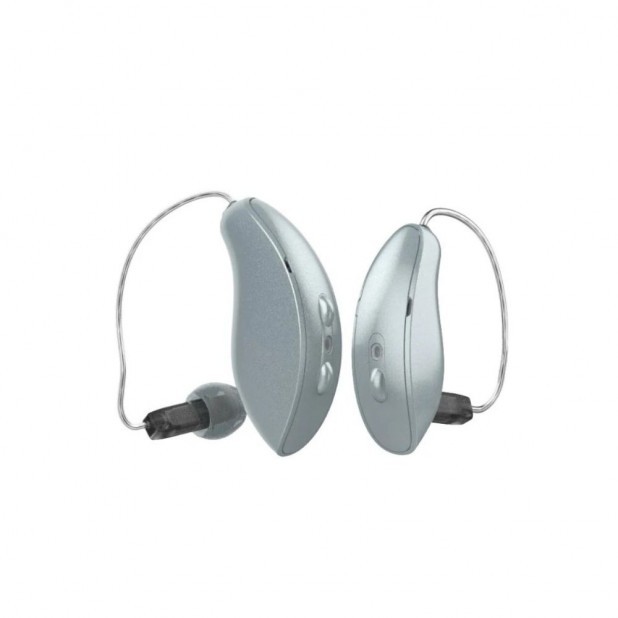
Starkey Omega AI mRIC R
The discreet and comfortable choice
The mini Receiver-in-Canal model prioritises discretion and comfort whilst maintaining all the advanced DNN 360 processing capabilities.
This is the most popular style in the Omega AI range, offering a balance between invisibility and functionality that many people find ideal.
Available in performance levels: 24, 20, and 16.
Available in colours: Silver, white, beige, caramel, graphite grey, chestnut, and tech black.
Features at a glance: Waterproof, wireless, rechargeable, and LED status indicator light.
Compatible accessories: StarLink Remote Microphone, Table Microphone, TV Streamer, and the My Starkey app.
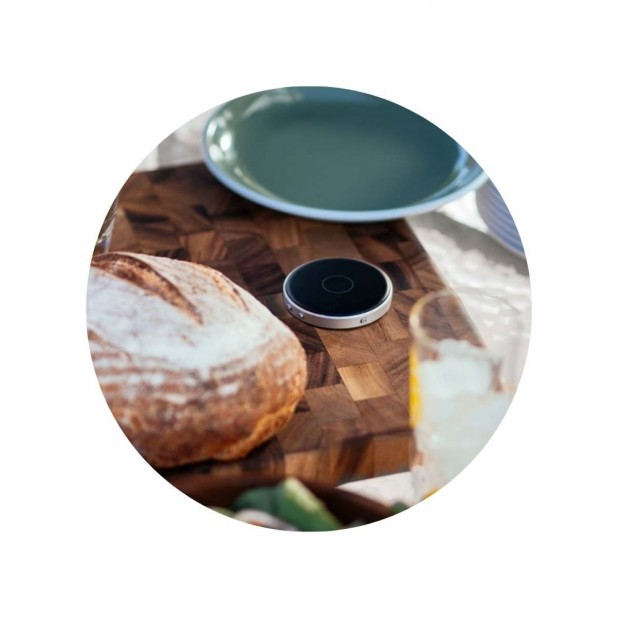
Nearly invisible design
The mini RIC sits discreetly behind your ear and is genuinely difficult to spot.
For those who've been self-conscious about visible hearing aids, this model offers modern technology in a package that virtually disappears.
All-day battery life and comfort
The 31-hour battery life (on the AI 24 model) is more than sufficient for a full day's use with streaming. Charge it overnight like your phone, and it'll reliably last through even busy days.
The smaller size means less weight and greater comfort for all-day wear. Designed to be so comfortable you forget you're wearing it.
Who should consider the Omega AI mRIC R?
Ideal for those wanting the most discreet option available, or anyone who's found larger hearing aids uncomfortable.
Particularly popular with active people who don't want hearing aids interfering with glasses, helmets, or other headwear.
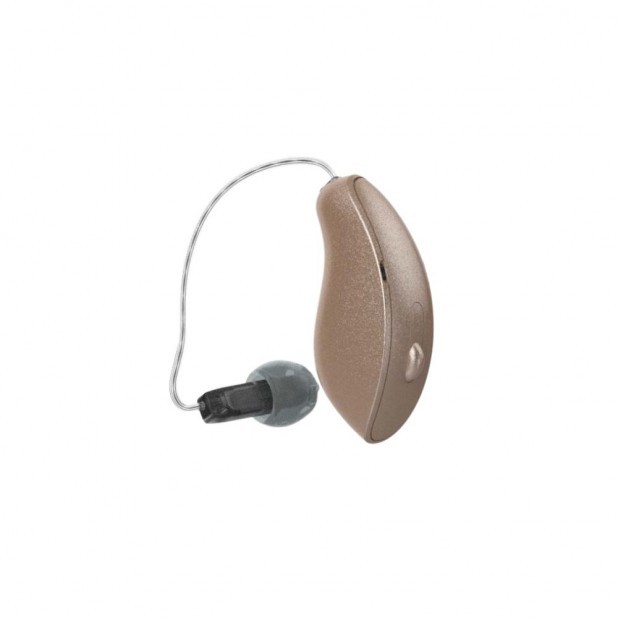
Starkey Omega AI RIC 312
Disposable battery flexibility for maximum choice
The RIC 312 offers all the advanced DNN 360 technology and intelligent sound processing of the Omega AI range, but with the flexibility of disposable zinc-air batteries.
This model is designed for people who prefer the traditional battery approach or who want the assurance of being able to swap batteries instantly rather than waiting for a charge.
Available in performance levels: 24, 20, and 16.
Available in colours: Silver, white, beige, caramel, graphite grey, chestnut, and tech black.
Features at a glance: Waterproof, wireless, traditional 312 battery, and LED status indicator light.
Compatible accessories: StarLink Remote Microphone, Table Microphone, TV Streamer, and the My Starkey app.

Size 312 battery system - proven reliability
Uses standard size 312 zinc-air batteries (brown tab), providing approximately 5-6 days of use. Widely available from supermarkets, pharmacies, and online retailers across the UK.
No charging equipment needed - simply carry spare batteries in your wallet and change them in seconds.
Same advanced technology, different power source
Choosing the RIC 312 doesn't mean sacrificing capability. You still get the full DNN 360 system, Edge Mode+, Bluetooth LE Audio streaming, and all health-tracking features. The only difference is how you power the devices.
Who should consider the Omega AI RIC 312?
Ideal for those who prefer disposable batteries, travel frequently to remote locations, or want the reassurance of instantly restoring power by swapping batteries rather than waiting for a charge.

Starkey Omega AI Hearing Aids
In the Ear model breakdown
ITE R (In-the-Ear Rechargeable)
This In-the-Ear model is the largest custom with the longest battery life. The ITE R sits in the outer portion of your ear. Whilst it's the most visible custom option, its size brings genuine advantages.
- Available in performance levels: 24, 20, and 16
- Available in colours: Black, dark brown, chestnut, medium brown, light brown, pink, clear, and blue/red
- Compatible accessories: StarLink Remote Microphone, Table Microphone, TV Streamer, and the My Starkey app
- All-day rechargeable battery - Up to 42 hours on a single charge, even with streaming.
- Easy-to-use physical controls - Volume adjustment and programme buttons you can actually use without fumbling.
- Suitable for more severe hearing loss - Accommodates more powerful receivers for mild to severe hearing loss.
- Pro10 HydraShield waterproofing - Tested to last 10 times longer than previous waterproofing methods.
- Who should consider the ITE R? - Ideal for those wanting the longest custom battery life, easy physical controls, or significant amplification. Worth considering if smaller devices are fiddly to handle.
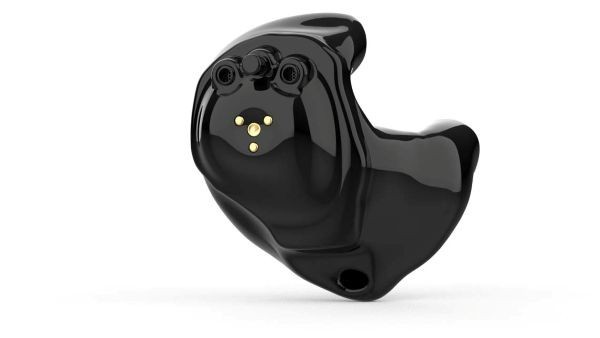
ITC R (In-the-Canal Rechargeable)
This model is the sweet spot between discretion and convenience. The In-the-Canal R sits in your ear canal, making it significantly more discreet than the ITE R whilst offering rechargeable convenience.
- Available in performance levels: 24, 20, and 16
- Available in colours: Black, dark brown, chestnut, medium brown, light brown, pink, clear, and blue/red
- Compatible accessories: StarLink Remote Microphone, Table Microphone, TV Streamer, and the My Starkey app
- Genuinely discreet design - Sits in the lower portion of your ear canal, genuinely difficult to spot from the side.
- All-day rechargeable power - Up to 42 hours of battery life. Charge overnight, use all day.
- Pro10 HydraShield waterproofing - Advanced protection against moisture, sweat, and British weather.
- Suitable for mild to moderately-severe hearing loss - Substantial amplification whilst maintaining a discreet appearance.
- Who should consider the ITC R? - Ideal for those wanting discreet custom hearing aids without sacrificing rechargeable convenience. Popular with those who find behind-the-ear models uncomfortable or interfere with glasses.
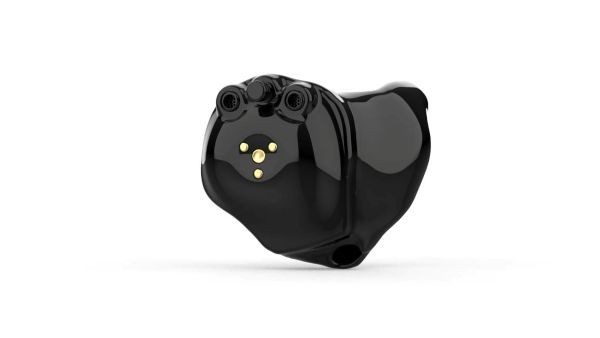
CIC (Completely-in-Canal)
This gives you maximum invisibility with traditional batteries. The Completely-in-the-Canal (CIC) is the smallest and most discreet custom model, fitting deep within your ear canal where it's genuinely difficult to spot.
- Available in performance levels: 24, 20, and 16
- Available in colours: Black, dark brown, chestnut, medium brown, light brown, pink, clear, and blue/red
- Compatible accessories: StarLink Remote Microphone, Table Microphone, TV Streamer, and the My Starkey app
- Virtually invisible when worn - Sits deep in your ear canal. Even close family members often forget you're wearing them.
- Size 312 disposable batteries - Approximately 7-8 days of use per battery. Widely available across the UK.
- Deep canal placement benefits - Delivers sound more naturally, virtually eliminates "blocked" feeling, and your own voice sounds more natural.
- Pro10 HydraShield waterproofing - Advanced protection despite tiny size.
- Suitable for mild to moderate hearing loss - Excellent sound quality in a package that virtually disappears.
- Who should consider the CIC? - Ideal for those prioritising maximum discretion and who don't mind changing batteries weekly. Excellent for people who wear glasses, as there's nothing behind the ear.
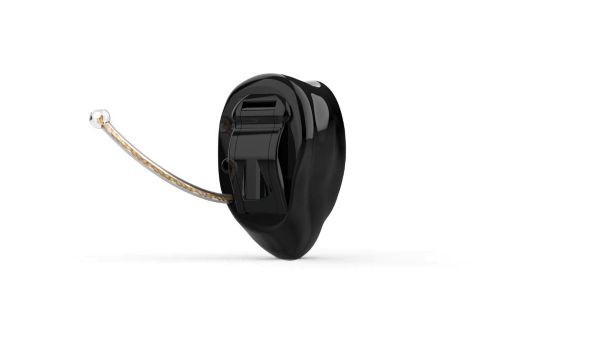
Watch the Starkey Omega AI hearing aid video
Starkey Omega AI Hearing Aids Information
Click on the buttons below to discover moreCompare the Starkey Omega AI hearing aid tech levels

Starkey Omega AI Hearing Aids
Additional information on the range
Range technology and performance levels
The Omega AI range is available in four performance levels: 24, 20, and 16. The higher the number, the more sophisticated the processing capabilities and the greater the number of channels and programmes available.
All levels include the DNN 360 processing, but the 24 and 20 models offer the most advanced features, including the full Edge Mode+ functionality and the most precise automatic adjustments.
For most people with moderate to moderately-severe hearing loss who lead varied lifestyles, the 24 or 20 levels represent the sweet spot between capability and value. The 16 still offers excellent performance for those with less demanding listening environments or tighter budgets.
Who should consider the Omega AI?
The Omega AI is ideal for people who need hearing aids that can genuinely handle life - from rainy commutes to busy family gatherings.
If you've been frustrated by hearing aids that work acceptably in quiet situations but struggle when you're actually out living your life, the DNN 360 technology addresses this with processing power that previous models simply didn't have.
It's particularly good for active individuals who need devices that won't be babied, and for anyone who appreciates technology that does more than just amplify sound.
Key takeaways
- DNN 360 Technology: The world's first deep neural network-powered directionality system that provides 360-degree hearing with up to 28% better speech intelligibility in challenging environments.
- Exceptional Battery Life: Up to 51 hours on the RIC RT and 31 hours on the mini RIC R - even with heavy streaming throughout the day.
- Enhanced Durability: Waterproof coating tested to last 10 times longer than previous models, with an IP68 rating for real-world reliability.
- Health and Wellness Features: Industry-first automatic respiratory rate monitoring, fall detection, and Balance Builder exercises for holistic health tracking.
- Edge Mode+ On-Demand Boost: Manual override for particularly challenging listening situations, giving you extra processing power exactly when you need it.
- Smart LED Indicators: Green and red lights confirm power status, Bluetooth connection, and help you locate misplaced devices in the dark.
- Futureproof Connectivity: Bluetooth LE Audio and Auracast-ready technology for seamless streaming to modern devices and future public venues.
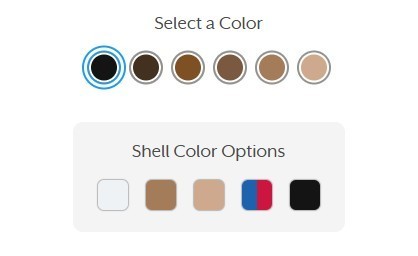
Summary
The Starkey Omega AI range represents a genuine leap forward in hearing aid technology. The DNN 360 system addresses real problems people face in understanding speech from multiple directions - this isn't just incremental improvement.
Starkey offers two models to match different priorities. The RIC RT delivers 51-hour battery life and telecoil functionality for maximum reliability. The mini RIC R offers a discreet design without compromising sound quality.
What sets the Omega AI apart is how it combines cutting-edge hearing technology with genuinely useful health-tracking features - respiratory rate monitoring, fall detection, and Balance Builder exercises. These aren't just devices that amplify sound, but comprehensive health companions.
For people who struggle with speech understanding in noisy environments and appreciate health-tracking features that go beyond hearing, the Omega AI offers technology that previous generations simply couldn't deliver.
The Omega AI is available through our nationwide network of over 200 qualified, independent audiologists who aren't tied to any single manufacturer - which means you're getting honest advice about whether these aids are right for you, not just a sales pitch.
All prices include fitting, programming, and lifetime aftercare, and we offer a full 60-day money-back guarantee because we're confident you'll hear the difference. Free home visits are available throughout the UK, or you can visit a local clinic - whichever suits you best.
Need more support?
Ready to experience the Starkey Omega AI difference?
Our qualified hearing care professionals can assess your specific hearing needs and help determine which Omega AI model best suits your lifestyle. Proper fitting and programming make all the difference in getting the full benefit of these sophisticated hearing aids.
We offer completely free home visits throughout the UK with our network of over 200 independent audiologists - no additional charges, no hidden fees.
We're not tied to any manufacturer, which means you get genuinely impartial advice about whether Omega AI is right for you.
Other pages you might find useful
Our specialist service includes:
Do not spend hundreds of pounds without getting a second opinion from us.
Please call us on 0800 567 7621
 Not only are the prices great, but the service is fantastic! Many thanks to your team.
Not only are the prices great, but the service is fantastic! Many thanks to your team.What's included in our hearing aid prices?
Explore the Starkey Omega AI hearing aid range
FAQs
In general, any audiologist will always recommend to you the hearing aid model that best suits your needs. Here is a useful checklist to make sure that is the case.
- Audiologist's level of knowledge: The audiologist you have seen will hopefully have a wide knowledge of all available hearing aids; however, some will only be familiar with a small number of brands and, therefore, may not really be in a position to know which model is the best for you. It is OK to challenge their recommendation and ask them to justify why this particular brand is the one for you.
- Do research: Read about the hearing aid that was recommended. Does it seem like it will suit your lifestyle? Does it have more or fewer features than you need?
- Be aware of sales targets: Many high street retailers have specific tie-ins to a particular manufacturer/brand. The hearing aid they have suggested may still be the correct one for you, but do your research so that you know why they might have recommended it.
If you have significant hearing loss in both ears, you should be wearing two hearing aids. Here are the audiological reasons why:
Localisation: The brain decodes information from both ears and compares and contrasts them. By analysing the minuscule time delays as well as the difference in the loudness of each sound reaching the ears, the person is able to accurately locate a sound source.
Simply put, if you have better hearing on one side than the other, you can't accurately tell what direction sounds are coming from.
Less amplification is required: A phenomenon known as “binaural summation” means that the hearing aids can be set at a lower and more natural volume setting than if you wore only one hearing aid.
Head shadow effect: High frequencies, the part of your hearing that gives clarity and meaning to speech sounds, cannot bend around your head. Only low frequencies can. Therefore, if someone is talking on your unaided side, you are likely to hear that they are speaking, but be unable to tell what they have said.
Noise reduction: The brain has its own built-in noise reduction, which is only really effective when it is receiving information from both ears. If only one ear is aided, even with the best hearing aid in the world, it will be difficult for you to hear in background noise as your brain is trying to retain all of the sounds (including background noise) rather than filtering them out.
Sound quality: We are designed to hear in stereo. Only hearing from one side sounds a lot less natural to us.
Fancy some further reading on this topic? You can read about why two hearing aids are better than one in our article, hearing aids for Both Ears, here
For most people, the main benefit of a rechargeable hearing aid is simple convenience. We are used to plugging in our phones and other devices overnight for them to charge up. Here are some other pros and cons:
For anybody with poor dexterity or issues with their fingers, having a rechargeable aid makes a huge difference, as normal hearing aid batteries are quite small and some people find them fiddly to change.
One downside is that if you forget to charge your hearing aid, then it is a problem that can't be instantly fixed. For most, a 30-minute charge will get you at least two or three hours of hearing, but if you are the type of person who is likely to forget to plug them in regularly, then you're probably better off with standard batteries.
Rechargeable aids are also a little bit bigger and are only available in Behind-the-Ear models.
Finally, just like with a mobile phone, the amount of charge you get on day one is not going to be the same as you get a few years down the line. Be sure to ask what the policy is with the manufacturer's warranty when it comes to replacing the battery.
For most people, the answer is yes. But it's never that simple.
The majority of hearing problems affect the high frequencies a lot more than the low ones. Therefore, open fitting hearing aids sound a lot more natural and ones that block your ears up can make your own voice sound like you are talking with your head in a bucket. Therefore, in-ear aids tend to be less natural.
However, the true answer is we can't tell until we have had a look in your ears to assess the size of your ear canal, and until we have tested your hearing to see which frequencies are being affected.
People with wider ear canals tend to have more flexibility, also there are open fitting modular CIC hearing aids now that do not block your ears.
There is also the age-old rule to consider, that a hearing aid will not help you if it's sat in the drawer gathering dust. If the only hearing aid you would be happy wearing is one that people can't see, then that's what you should get.
Most people can adapt to any type of hearing aid, as long as they know what to expect. Have an honest conversation with your audiologist as to what your needs are.
Generally speaking, six or more. Unless it's none at all. The number of channels a hearing aid has is often a simplistic way an audiologist will use to explain why one hearing aid is better than another, but channels are complex, and it is really not that straightforward. Here are some reasons why:
Hearing aids amplify sounds of different frequencies by different amounts. Most people have lost more high frequencies than low, and therefore need more amplification in the high frequencies. The range of sounds you hear is split into frequency bands or channels, and the hearing aids are set to provide the right amount of hearing at each frequency level.
Less than six channels, and this cannot be done with much accuracy, so six is the magic number. However, a six-channel aid is typically very basic with few other features and is suitable only for hearing a single speaker in a quiet room. The number of channels is not what you should be looking at; it's more the rest of the technology that comes with them.
As a final note, different manufacturers have different approaches. One method is not necessarily better than any other. For example, some manufacturers have as many as 64 channels in their top aids. Most tend to have between 17 and 20. One manufacturer has no channels at all.
Manufacturer's warranties typically last between 2-5 years, depending on the brand and model, and cover defects in materials and workmanship. This includes repairs for component failures, electronic malfunctions, and manufacturing defects, but excludes damage from misuse, accidents, or normal wear. Most manufacturers also include loss and damage insurance for the first year.
We handle all warranty claims on your behalf, liaising with manufacturers and ensuring you get replacement devices quickly when needed. This comprehensive warranty coverage, combined with our lifetime aftercare, gives you complete peace of mind.
Our hearing tests are completely free, whether at our clinics or in your home. Unlike other providers who charge £30-£100 for home visits, we believe hearing healthcare should be accessible without financial barriers. Our comprehensive assessments include examination by a registered audiologist, audiogram results, and personalised recommendations.
All testing, future adjustments, and ongoing support are included at no extra cost. While NHS tests are also free, typical 6-week waiting periods often lead people to seek immediate private testing. We provide prompt, professional assessments that fit your schedule and budget.
Yes, we offer completely free home visits throughout the UK, and this service is included in our prices with no additional charges. Home visits are particularly valuable for people with mobility issues, busy schedules, or those who simply prefer the comfort and convenience of their own environment.
Our audiologists can conduct full hearing tests, fit hearing aids, and provide ongoing support in your home. This service sets us apart from many providers who either don't offer home visits or charge extra for them.
We can offer prices up to 40% lower than high street retailers because of our business model. As a network of 200+ independent audiologists, we don't have the massive overheads of large retail chains - no expensive high street premises, no sales targets pushing audiologists to sell the most expensive options, and no costly marketing campaigns.
However, we maintain the same buying power as the big chains because we purchase on behalf of our entire nationwide network. This means you get access to the same premium hearing aids with professional service, but at genuinely competitive prices.
We offer a comprehensive 60-day money-back guarantee, which gives you twice the industry standard time to properly assess whether your hearing aids are right for you. This extended period recognises that adjusting to hearing aids takes time, and your brain needs several weeks to adapt to the amplified sounds.
Unlike many providers who offer just 30 days, we believe 60 days gives you the confidence to test your hearing aids in all the situations that matter to you - from quiet conversations at home to busy restaurants and outdoor activities.
Ask the Experts
6 Morton Lane
Walkwood
Redditch
Worcestershire
B97 5QA
Latest Launch
When we refer to a product as 'Latest Launch', we mean it is the latest to be released on the market.
New
When we refer to a product as 'New', we mean that the product is the newest hearing aid model on the market.
When we refer to a product as 'Superseded', we mean that there is a newer range available which replaces and improves on this product.
Older Model
When we refer to a product as an 'Older Model', we mean that it is has been superseded by at least two more recent hearing aid ranges.


